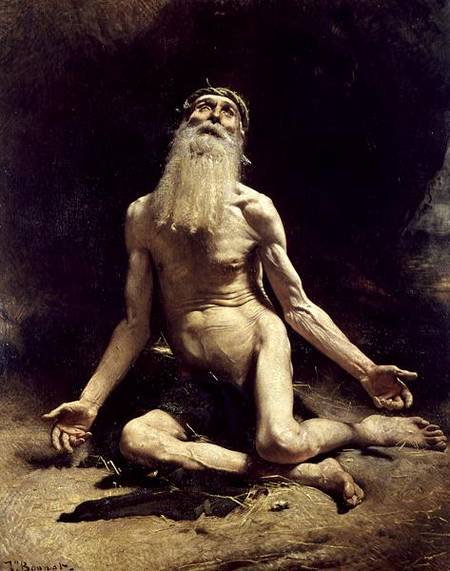God responds to Job out of the whirlwind, Where were you when I laid the foundations of the earth? (Job 38:4). In Ronald E. Osborn's book Death Before The Fall: Biblical Literalism and the Problem of Animal Suffering, Osborn asks whether God is irritated with Job questioning, and answers with a quotation from Slavoj Žižek that God is not irritated, but that God is also ignorant of the answer! This isn't a mocking of the Biblical text, or an affirmation of Open Theism, or a refutation of the omniscience of God. What this means is that God is with us, he is Immanuel! God is identified with us specifically as Jesus Christ, who is fully God and fully man, and in every way like us, such that in God's answer to Job is an anticipation of the Passion of Jesus Christ who also asked, "My God, My God, why have you forsaken me?"
This quotation from Olson (and Zizek) has striking parallel's to Jürgen Moltmann's masterpiece, The Crucified God, and in that book Moltmann explains that we should reject the older Theodicy paradox that forces us to choose whether we believe God is good or sovereign. Instead, we look to the crucified Jesus Christ, and know that Jesus is with us in our suffering, and he is there asking God, Where are you in our suffering?
Perhaps Slavoj Žižek has discerned a vital truth in his provocative rereading of the book of Job not as a story of divine power over creation but instead, in a certain sense, of divine impotence within it. God "solves the riddle by supplanting it with an even more radical riddle, by redoubling the riddle," Žižek declares, "he himself comes to share Job's astonishment at the chaotic madness of the created universe." God's answer from out of the whirlwind amounts not to a negation but an intensification of Job's protest. What is God in effect saying, Žižek proposes, is that he too has no rational answer for the creation, that he is suffering along with Job. If God sounds slightly irritable it's because he's really just trying to hold it all together! But Žižek (a self-described atheistic materialist) goes still further, pressing the final chapters of Job in the direction of a radically christocentric interpretation that sees Job's silence at the end of the book as being filled with the pathos of one survivor bearing prophetic witness to the sufferings of another:
What Job suddenly understood was that it was not him, but God himself who was in effect on trial in Job's calamities, and he failed the test miserably. Even more pointedly, I am tempted to risk a radical anachronistic reading: Job foresaw God's own future suffering -- "Today it's me, tomorrow it will be your own son, and there will be no one to intervene for him. What you see in me now is a prefiguration of your own Passion!" [Slavoj Žižek, The Monstrosity of Christ, The Fear of Four Words, pg53]
Ronald E. Osborn, Death Before The Fall: Biblical Literalism and the Problem of Animal Suffering, pg158




October 6th, 2014 - 14:52
What’s up to every one, it’s really a pleasant for me to pay a visit
this web page, it includes useful Information.
September 18th, 2015 - 07:19
Excellent blog! Do you have any tips and hints for aspiring writers?
I’m planning to start my own blog soon but I’m a little lost on everything.
Would you advise starting with a free platform like WordPress or
go for a paid option? There are so many choices out there that I’m totally overwhelmed
.. Any tips? Thanks!
September 18th, 2015 - 15:42
I use wordpress on a self hosted website. Its worked well enough for me. There are other options that may be better and cheaper. Thanks for visiting my blog. I checked out your blog. Looks good so far!